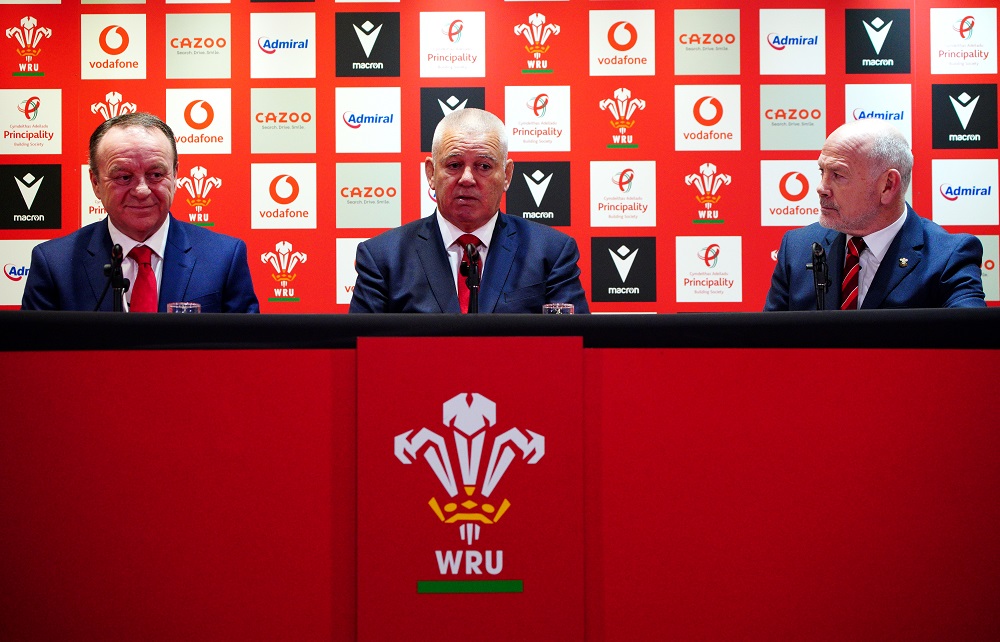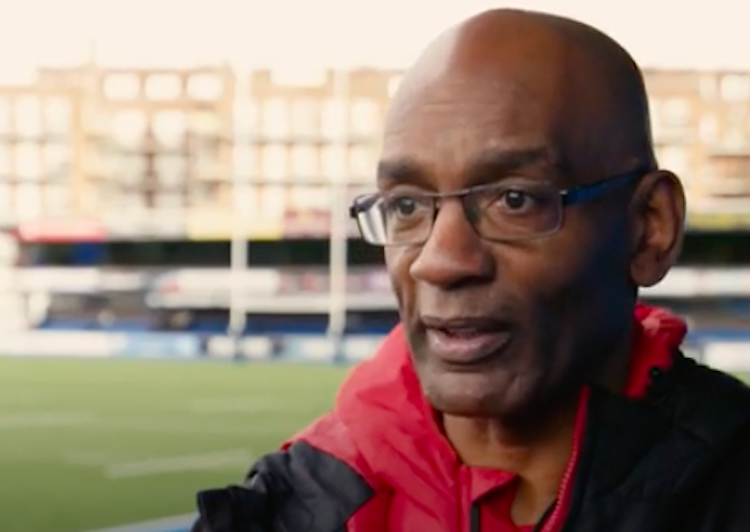Where now for Welsh rugby after a year of trial and turmoil?

Simon Thomas
Welsh rugby heads into the new year with one headline-grabbing decision having been made, but lots of other issues still to be resolved.
The autumn internationals marked the end of the road for Wayne Pivac as Wales coach and a return to the helm for Warren Gatland.
You never like to see anyone lose their job and Pivac is a decent bloke who gave it his best shot, but it’s a results business and the results just weren’t good enough.
Wales’ 12 Tests in 2022 brought only three wins, while there were jolting home defeats to both Italy and Georgia, losses that gave a sense of inevitability to his ultimate departure.
The harsh reality is that without success at international level, the sums just don’t add up. It’s the financial engine of the sport in this country, by far the largest source of income and the primary means of funding the domestic game.

Failure means substantial lost revenue in terms of ticket sales, merchandise and competition prize money, so it just can’t be allowed to continue.
Therefore, the Welsh Rugby Union decided Pivac had to go and turned to his countryman Gatland in the hope he can once again bring that required success, luring him back with a lucrative deal that could run through to 2027.
That, in turn, has thrown up a number of follow-up questions. Firstly, who will he bring on board as assistants? A reunion with Rob Howley, his attack coach for a decade, has been heavily touted, while Jonathan Thomas, Steve Tandy, Robin McBryde and Paul Gustard have all been mentioned as contenders, along with the existing occupants of the back-room.
Then what about the players he will select? It’s often the case that an international coach takes over after a World Cup, at the beginning of a new four-year cycle. That tends to mean farewell to some stalwart servants and the introduction of a batch of fresh faces.
But Gatland is coming in with less than a year to go to the 2023 World Cup. So will he ask senior figures like Alun Wyn Jones (37), Leigh Halfpenny (34), Dan Biggar (33), Justin Tipuric (33), Dan Lydiate (35) and Ken Owens – 36 next week – to keep on going through to France? Or will he want to reduce the age profile of the squad from the outset, with a significant portion of the group over 30?
What will be particularly interesting is whether he will recall some of those players who were overlooked and omitted during the Pivac era, in-form men like Thomas Young, Rhys Carre, Ross Moriarty, Jarrod Evans, Rhys Webb and Nicky Smith.

Then what of the uncapped contenders, such as Ospreys trio Morgan Morris, Rhys Davies and Kieran Williams, along with Scarlets and Dragons wingers Ryan Conbeer and Ashton Hewitt, while Cardiff’s 6ft 5ins, 17st 4lbs centre Mason Grady could be right up his street.
The encouraging thing is there is plenty of young talent out there, with the likes of Louis Rees-Zammit, Jac Morgan, Rio Dyer, Tommy Reffell, Dewi Lake, Taine Basham, Sam Costelow, Bradley Roberts, Christ Tshiunza, Joe Hawkins and Dafydd Jenkins offering a real vibrancy.
Then you have those proven Test performers that he knows so well from his previous tenure in Taulupe Faletau, George North, Liam Williams, Tomas Francis et al – or et Alun Wyn & Co.
So just how will Gatland juggle his resources? How will he intermingle the new and the old? All will be revealed in the coming weeks.
As for the regions, it’s Cardiff who are leading the way heading into the new year. They have won eight out of 12 matches in all competitions so far this season and are very handily placed in fifth spot in the BTK United Rugby Championship, with two home derbies to come in the opening week of January.
The Ospreys look to have turned the corner somewhat, with their recent Heineken Champions Cup victory away to French title holders Montpellier one of the all-time great results by a Welsh team in Europe, while the Dragons have been far more competitive this term. It’s the Scarlets who will be most disappointed, having won just one of their ten URC matches, although they have fared better in the Challenge Cup.
But, for all four regions, it’s off the field where they face the toughest hurdles.
Exodus
Negotiations over a financial settlement with the WRU have dragged on for months and months, leading to an atmosphere of uncertainty and instability.
Amid the wrangling, a freeze was placed on offering new contracts, leaving a host of players and staff in limbo. Conditional contracts are now to be put on the table and verbal agreement has been reached over a six-year funding framework.
But, until it is all nailed down, things remain very much up in the air and the indications are the next two years are going to be pretty challenging financially for the regions, with a significant amount of belt tightening and budget trimming involved.
Understandably, given all the uncertainty, some players have decided to move on. Wales’ player of the year Will Rowlands will be leaving the Dragons at the end of the season to reportedly join French club Racing 92, while highly-rated Cardiff centre Max Llewellyn is off to England, most likely Gloucester.
The concern is that others will follow amid something of an exodus.
That, in turn, has inevitably led to questions being raised over the WRU’s 60-cap rule. Up to now, it has done its job in terms of ensuring the bulk of the Wales squad is based on home soil, meaning they are available for all international duties.
But if you are going to demand loyalty, you have to be able to reward that financially to a reasonably competitive level and it’s questionable whether that will be the case across the board amid talk of pay cuts. Players want to pull on the red jersey, but they also have to make a living and look after their families.
If, as a result of the economic climate, the 60-cap rule ceases to serve as a sufficient deterrent to star turns leaving the country, can it survive?
Might it have to be tinkered with, perhaps with a reduction to 40 caps, or done away with altogether?

It’s a tricky business, as having star names based in England or France eases the finances, with their wages being covered by clubs in those countries, but it means they will miss numerous Wales training sessions, impacting preparation, plus the out-of-window autumn Test.
Moreover, they won’t be helping the regions push for success and young fans won’t be able to watch their heroes in the flesh.
But, on the other hand, current Wales players are unavailable to the pro teams for long periods due to international calls. So there is an argument that having fewer of them and more season-long overseas players on board might be a better bet.
It’s a real head scratcher. What’s certain is the regions will have to think long and hard about the make-up of their squads amid the financial constraints – that’s once they finally know their budgets.
On the subject of which, the hope must be that a firm deal can be struck early in the new year to at least provide some degree of certainty for all involved.
The other great hope is that all four regions will remain in place. We have seen just how precarious the world of professional rugby can be with Wasps and Worcester both going into administration in England.
That’s a horrible experience and something you would hate to see happening here in Wales.
On a purely practical level, cutting to three pro teams would significantly reduce the player pool, but more importantly there is the human aspect. It would mean large numbers of people losing their jobs and would be a body blow to those fans who have invested so much in their teams over the years.
The anticipated financial settlement has been dubbed a survival deal in some quarters. While survival funding is far from ideal in terms of enabling teams to compete, one can only hope it will do its job in terms of all four teams emerging the other side, with improved resourcing then to follow.
Ultimately, the regions are the supply chain for Team Wales, which in turn finances the whole domestic game, so if the regions wither the whole of Welsh rugby suffers. It is crucial everything possible is done to keep them afloat and provide them with a viable future.

In terms of the playing conveyor belt, getting the pathway operating smoothly and providing the right development for talented youngsters remains an absolute priority, while working to increase participation numbers at the community level is an ongoing challenge.
From a wider perspective, the other big issue that needs resolving is the governance of the sport in this country. We still have a situation where the amateur clubs have ultimate control over all aspects of the game and there is a growing feeling that needs to change.
There were two glaring examples of the current state of affairs this year.
The WRU executive, with performance director Nigel Walker at the vanguard, wanted to see the Welsh Premiership reduced from 12 to 10 clubs to raise standards and make it a finishing school for young regional players.
But the WRU Community Game Board, which features representatives from the amateur clubs, decided it should instead be increased to 14 teams from 2023-24, sticking to the original plan agreed upon in 2021.
Then there was the proposal from the WRU Board that they should be allowed to appoint an independent chair if they so wished. The idea was they would be able to bring in someone with the required skills and acumen to run a £100m business, rather than having to go with someone elected by the clubs.
But the proposal failed to secure the required 75 per cent approval at the WRU Annual General Meeting, with a group of community clubs effectively blocking the move.
So the amateur teams continue to have the ultimate say, despite repeated calls for the administration of the professional and community games to be separated.
The whole question of modernising and re-modelling the governance will doubtless continue to be a major talking point in 2023, amid a series of issues which need to be resolved.
Support our Nation today
For the price of a cup of coffee a month you can help us create an independent, not-for-profit, national news service for the people of Wales, by the people of Wales.







Too much protectionism within the WRU. You won’t make change if it affects your own position.